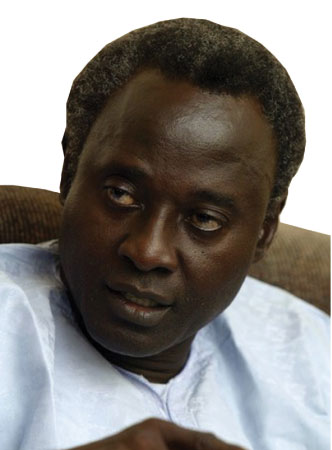
The Secretary General of the Peoples Democratic Organisation for Independence and Socialism (PDOIS), Halifa Sallah, has written to President Jammeh on his pronouncement on the implementation of the death penalty.
Sallah, who is also the spokesperson of the Group of Six opposition parties in the country said, in a letter addressed to the Gambian leader and copied to this paper, that it is strange that President Jammeh has selected a day utilised by Muslims for forgiveness and reconciliation to announce that the death penalty will be put into effect.
According to Sallah, what is expected at this moment are discussions on electoral reform and not the soaking of the earth with blood in the name of promoting national security.
Below we reproduce the full text of Halifa’s letter to President Jammeh:
SECRETARY GENERAL
PEOPLE DEMOCRATIC ORGANISATION FOR INDEPENDENCE AND SOCIALISM
1 SAMBOU STREET
CHURCHILL’S TOWN
THE PRESIDENT OF THE REPUBLIC OF THE GAMBIA
STATE HOUSE
BANJUL
REPUBLIC OF THE GAMBIA
THE NEED FOR A REFERENDUM ON THE DEATH PENALTY AND AVOID IMPUNITY
Rumours are rife that execution of persons sentenced to death has started. We still assume that this is hearsay. The reason for this is simple. Whatever is done by the President of the Republic of the Gambia must be done according to law. In this respect I would like to draw your attention to certain provisions of the Constitution and other laws which should guide the conduct of your government with regard to the execution of the death penalty.
First and foremost, it is not the language of the law for persons sentenced to death to be summarily executed in secret. Once the sentence is confirmed the trial judge is required to forward a copy of the finding and sentence to the president and the Minister of Justice.
The Minister of Justice is required to give his advice to the President. The President has the prerogative to issue a death warrant or an order for the sentence of death to be commuted or a pardon. The order of the president should carry the public seal. The Minister is required to send a copy of the President’s order to the Judge to be entered in the Court record.
Suffice it to say that if the President orders for the sentence of death to be carried out, the warrant shall state the place where and the time when the execution is to take place and where the body is to be buried. This order becomes lawful when it is published in the Gazette.
This is the procedure that is required by law.
We are not aware that such processes had taken place last week. This is why we are yet to be able to confirm or dismiss the rumour.
We hope maximum effort will be made by the Office of the President and the Minister of Justice to clarify matters. This the first point.
Secondly, you are well aware that the death penalty was only applied once since 1965 in the case of Mustapha Danso after the 1981 coup d’etat. It was abolished in 1993 when the Death Penalty Abolition Act of 1993 was enacted.
As a result of this, all those who were sentenced to death had their sentences commuted to life. A person like Lamin Darboe was sentenced to death in the 1980s and had his sentence commuted to life.
In fact he could have escaped during the 1994 coup when the prisoners could take to their heels. He chose to remain hoping that his act of honesty would earn him the dividend of being released. Instead on 25 April 1995 the death sentence was restored by the Armed Forces Ruling Council even before the coming into force of the Death Penalty Restoration Decree 1995 (Decree 52) on 10 August 1995.
The decree did state that no person shall be sentenced to death on a charge of murder or treasonable offence committed between the period of enactment of that Act (meaning the Death Penalty Abolition Act) and the coming into force of this decree.
Since nobody who had committed treasonable act or murder between 1993 when the death penalty was abolished and 1995 when it was restored could be sentenced to death it is equally in line with the principles of natural justice and equity that those whose sentences were commuted to life imprisonment because of the 1993 abolition of the death penalty should not have their sentences to death restored after the restoration of the death penalty.
Justice dictates that Lamin Darboe is removed from death row. His sentence was commuted to life imprisonment and it is not reasonable and justifiable to condemn him to death after the restoration of the death penalty.
In fact, since he refused to escape on the day of the 1994 coup d’etat he deserves a conditional or unconditional pardon. This is the second point.
Thirdly, since the restoration of the death penalty in 1995 no death warrant has been issued for the past 17 years. It is therefore strange that you have selected a day utilised by Muslims for forgiveness and reconciliation to announce that the death penalty will be out into effect.
In our view developments in 1997 have ousted many provisions in our Criminal Code which provide for the imposition of the death penalty for offences whose perpetration do not include the use of violence that results in the death of a person.
Currently, there are many people on death row who had not actually taken a weapon to kill anyone. Such people should have their sentences commuted to life imprisonment or be granted pardon. This is the language of the Constitution.
In short, Section 18 subsection (2) of the 1997 Constitution reads: “After the coming into force of this constitution, no court in The Gambia shall be competent to impose a sentence of death for any offence unless the sentence is prescribed by law and the offence involves violence, or the administration of any toxic substance, resulting in the death of another person.” Hence it is incontrovertible that no one could be sentenced to death who has not killed anyone.
Hence if a court makes a mistake in sentencing a person to death who has not actually perpetrated violence to kill anyone it is the duty of the Minister of Justice to advise the president to commute such a sentence to life imprisonment. This is the second point.
Thirdly, the Constitution cautions restraint in the implementation of the death penalty until there is a thorough discussion on the subject of abolishing the death penalty.
In a word, section 18 subsection (3) reads: “The National Assembly shall within ten years from the date of the coming into force of this Constitution review the desirability or otherwise of the total abolition of the death penalty in The Gambia.”
Ten years have already elapsed and such a review has not taken place. This provision needs to be amended to provide more time to enable the National Assembly to conduct the review.
Since it is part of the entrenched provisions its amendment would require a referendum.
It is therefore our candid view that your government should commute all death sentences to life imprisonment pending the holding of a referendum for the people to review the desirability or otherwise of the total abolition of the death penalty, and make a decision. This is the way forward.
The President of the Republic is granted the Prerogative of Mercy in order to balance retribution with mercy. This is why the citizenry is empowered to petition the President.
It is not proper for a head of state to make a unilateral declaration that no one should approach him to make a plea for mercy.
Let me take this opportunity to convey to you that we have received information that Wuyeh Colley and Enor Colley from Karunorr, Foni Kansala, were abducted from their village on Tuesday 7th August 2012 by some armed men on board two military jeeps without number plates, and dressed in combat gears and wearing war style masks who stormed the village and whisked them away and, apparently, shot them dead on the Casamance side of The Senegalese border.
This tragedy is what requires immediate investigation in order to give security to the people.
To conclude, allow me to reiterate that every country in Africa is moving towards national dialogue to improve its governance environment.
PDOIS, in particular, and the Group of Six in general are on the verge of creating the basis for dialogue to effect electoral reform in The Gambia.
Any spilling of blood at this juncture will excite such universal outcry and condemnation that sitting on a table to negotiate the mechanisms for improving the governance environment would suffer a tremendous setback, as we would be compelled to lead such outcry in the national interest.
Zimbabwe provides a clear example of the way forward for peaceful transition to a democratic constitutional order. What is expected at this moment are discussions on electoral reform, and not the soaking of the earth with blood in the name of promoting National Security.
History has already taught that power is transient, and everything that is said and done will be relied on by posterity to judge each person according to his or her words and deeds. The future will tell.
Yours in the service of humanity
Halifa Sallah
For the Central Committee
cc. Honourable Chief Justice
Attorney General and Minister of Justice
Gambia Bar Association



